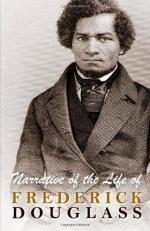The home plantation of Colonel Lloyd wore the appearance of a country village. All the mechanical operations for all the farms were performed here. The shoemaking and mending, the blacksmithing, cartwrighting, coopering, weaving, and grain-grinding, were all performed by the slaves on the home plantation. The whole place wore a business-like aspect very unlike the neighboring farms. The number of houses, too, conspired to give it advantage over the neighboring farms. It was called by the slaves the Great House Farm. Few privileges were esteemed higher, by the slaves of the out-farms, than that of being selected to do errands at the Great House Farm. It was associated in their minds with greatness. A representative could not be prouder of his election to a seat in the American Congress, than a slave on one of the out-farms would be of his election to do errands at the Great House Farm. They regarded it as evidence of great confidence reposed in them by their overseers; and it was on this account, as well as a constant desire to be out of the field from under the driver’s lash, that they esteemed it a high privilege, one worth careful living for. He was called the smartest and most trusty fellow, who had this honor conferred upon him the most frequently. The competitors for this office sought as diligently to please their overseers, as the office-seekers in the political parties seek to please and deceive the people. The same traits of character might be seen in Colonel Lloyd’s slaves, as are seen in the slaves of the political parties.
The slaves selected to go to the Great House Farm, for the monthly allowance for themselves and their fellow-slaves, were peculiarly enthusiastic. While on their way, they would make the dense old woods, for miles around, reverberate with their wild songs, revealing at once the highest joy and the deepest sadness. They would compose and sing as they went along, consulting neither time nor tune. The thought that came up, came out—if not in the word, in the sound;—and as frequently in the one as in the other. They would sometimes sing the most pathetic sentiment in the most rapturous tone, and the most rapturous sentiment in the most pathetic tone. Into all of their songs they would manage to weave something of the Great House Farm. Especially would they do this, when leaving home. They would then sing most exultingly the following words:—
“I am going away
to the Great House Farm!
O, yea! O, yea!
O!”
This they would sing, as a chorus, to words which to many would seem unmeaning jargon, but which, nevertheless, were full of meaning to themselves. I have sometimes thought that the mere hearing of those songs would do more to impress some minds with the horrible character of slavery, than the reading of whole volumes of philosophy on the subject could do.




